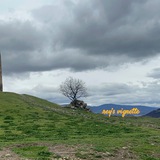View in Telegram
rey’s vignette
"A new star has been discovered, which doesn't mean that things have gotten brighter or that something we've been missing has appeared. The star is large and distant, so distant that it's small, even smaller than others much smaller than it. Small wonder…
It was written in marble in golden letters:
here a great man lived and worked and died.
He laid the gravel for these paths personally.
This bench — do not touch — he chiseled by himself
out of stone.
And — careful, three steps — we're going inside.
He made it into the world at just the right time.
Everything that had to pass, passed in this house.
Not in a high rise,
not in square feet, furnished yet empty,
amidst unknown neighbors,
on some fifteenth floor,
where it's hard to drag school field trips.
In this room he pondered,
in this chamber he slept,
and over here he entertained guests.
Portraits, an armchair, a desk, a pipe, a globe, a flute,
a worn-out rug, a sun room.
From here he exchanged nods with his tailor and
shoemaker
who custom made for him.
This is not the same as photographs in boxes,
dried out pens in a plastic cup,
a store-bought wardrobe in a store-bought closet,
a window, from which you can see clouds better
than people.
Happy? Unhappy?
That's not relevant here.
He still confided in his letters,
without thinking they would be opened on their
way.
He still kept a detailed and honest diary,
without the fear that he would lose it during a
search.
The passing of a comet worried him most.
The destruction of the world was only in the hands
of God.
He still managed not to die in the hospital,
behind a white screen, who knows which one.
There was still someone with him who remembered
his muttered words.
He partook of life
as if it were reusable:
he sent his books to be bound;
he wouldn't cross out the last names of the dead from his address book.
And the trees he had planted in the garden behind the house
grew for him as Juglans regia
and Quercus rubra and Ulmus and Larix
and Fraxinus excelsior.
A Great Man’s House, Wislawa Szymborska, translated by Joanna Trzeciak
here a great man lived and worked and died.
He laid the gravel for these paths personally.
This bench — do not touch — he chiseled by himself
out of stone.
And — careful, three steps — we're going inside.
He made it into the world at just the right time.
Everything that had to pass, passed in this house.
Not in a high rise,
not in square feet, furnished yet empty,
amidst unknown neighbors,
on some fifteenth floor,
where it's hard to drag school field trips.
In this room he pondered,
in this chamber he slept,
and over here he entertained guests.
Portraits, an armchair, a desk, a pipe, a globe, a flute,
a worn-out rug, a sun room.
From here he exchanged nods with his tailor and
shoemaker
who custom made for him.
This is not the same as photographs in boxes,
dried out pens in a plastic cup,
a store-bought wardrobe in a store-bought closet,
a window, from which you can see clouds better
than people.
Happy? Unhappy?
That's not relevant here.
He still confided in his letters,
without thinking they would be opened on their
way.
He still kept a detailed and honest diary,
without the fear that he would lose it during a
search.
The passing of a comet worried him most.
The destruction of the world was only in the hands
of God.
He still managed not to die in the hospital,
behind a white screen, who knows which one.
There was still someone with him who remembered
his muttered words.
He partook of life
as if it were reusable:
he sent his books to be bound;
he wouldn't cross out the last names of the dead from his address book.
And the trees he had planted in the garden behind the house
grew for him as Juglans regia
and Quercus rubra and Ulmus and Larix
and Fraxinus excelsior.
A Great Man’s House, Wislawa Szymborska, translated by Joanna Trzeciak
Love Center - Dating, Friends & Matches, NY, LA, Dubai, Global
Find friends or serious relationships easily
